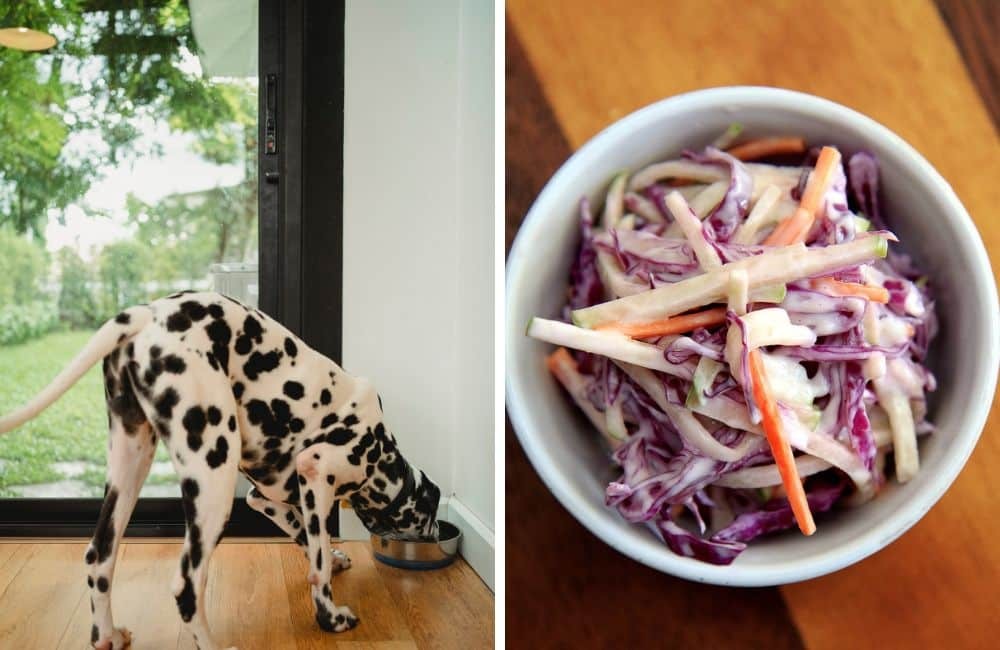
Coleslaw, a popular side dish at barbecues and restaurants, presents potential risks when consumed by dogs. While small amounts may not cause immediate harm, veterinary experts advise against intentionally feeding coleslaw to canines. The dish's common ingredients including mayonnaise, onions, garlic, vinegar, and seasonings can trigger various adverse effects ranging from mild digestive issues to severe toxicity. The high fat content from mayonnaise can lead to pancreatitis, while ingredients like onions and garlic are known to be toxic to dogs. Even the primary ingredient, cabbage, poses potential choking hazards and can cause gastrointestinal distress in some dogs.
Health Risks and Emergency Response for Dogs Eating Coleslaw
Immediate Health Concerns and Symptoms
When dogs consume coleslaw, several concerning symptoms may develop within 12-24 hours according to veterinary guidance. Key warning signs include:
- Persistent vomiting and diarrhea lasting over 12 hours
- Lethargy and weakness
- Reduced food consumption
- Presence of blood in vomit or stool
- Pale gums and elevated heart rate (particularly if onions were present)
- Heavy breathing and panting
- Red-colored urine
Emergency Steps and Veterinary Care
If your dog has consumed coleslaw, take these immediate actions as recommended by experts:
Document ingredients: Make a detailed list of all ingredients in the coleslaw, especially noting toxic components like onions and garlic.
Contact professionals:
- Call pet poison hotline immediately if toxic ingredients were present
- Consult nearest veterinarian, particularly for:
- Small dogs who consumed large amounts
- Presence of toxic ingredients
- Severe or persistent symptoms
- Pre-existing health conditions
- Monitor closely: Even without toxic ingredients, observe your dog for 24 hours for signs of digestive distress or other adverse reactions.
The severity of the response often depends on:
- Amount consumed relative to dog's size
- Specific ingredients present
- Dog's overall health status
- Speed of medical intervention
Is Coleslaw Safe for Dogs?
Primary Safety Concerns
While the previous report covered health risks after consumption, this section focuses on the fundamental safety aspects. According to veterinary experts, coleslaw is definitively unsafe for dogs due to several key factors:
- Choking hazard from finely chopped cabbage pieces
- Presence of toxic ingredients in many recipes (onions, garlic powder)
- High fat content from mayonnaise that can trigger pancreatitis
- Risk of hypothyroidism from thiocyanate in raw cabbage
Alternative Safe Options
Rather than standard coleslaw, experts recommend these safer alternatives:
- Plain shredded carrots and cabbage before dressing
- "Skinny" version made with:
- Low-fat plain yogurt instead of mayonnaise
- Small amounts of apple cider vinegar
- No added salt, sugar or seasonings
- Served before adding spices
- Keep portions small and occasional only
- Always prepare separately from human portions to avoid cross-contamination with unsafe ingredients
The key is offering the nutritional benefits of the vegetables while eliminating problematic dressings and additives that make traditional coleslaw unsafe for canine consumption.
Harmful Ingredients in Coleslaw for Dogs
High-Risk Ingredients
While previous reports covered general safety concerns, this section specifically details the most problematic ingredients according to veterinary sources:
Mayonnaise Components:
- Raw eggs can carry salmonella
- Soybean oil may cause digestive issues
- High fat content increases pancreatitis risk
Seasoning Dangers:
- Onion powder: More concentrated toxicity than fresh onions
- Garlic powder: 5x more potent than fresh garlic
- Both can cause severe anemia even in small amounts
Chemical Compounds and Additives
Research indicates several concerning chemical elements in coleslaw ingredients:
Preservatives: Many commercial coleslaws contain:
- Sodium benzoate
- Potassium sorbate
- Artificial stabilizers
Harmful Compounds:
- Thiocyanate in raw cabbage interferes with thyroid function
- Acetic acid in vinegar can damage tooth enamel
- Artificial sweeteners may be toxic depending on type
- Food colorings can trigger allergic reactions
These chemical components pose greater risks than whole food ingredients, particularly in processed store-bought versions.
Nutritional Impact and Portion Guidelines
Long-Term Health Effects
While previous reports focused on immediate risks and toxic ingredients, this section examines the nutritional impact of regular coleslaw consumption according to veterinary research. Regular consumption can lead to:
Metabolic Issues:
- Blood sugar imbalances from added sugars
- Increased insulin resistance
- Disrupted gut microbiome from preservatives
- Compromised kidney function from excess salt
Weight-Related Complications:
- Joint stress from obesity
- Breathing difficulties
- Increased heart strain
- Higher diabetes risk
- Reduced mobility and activity levels
Safe Serving Guidelines
Experts recommend the following portion control measures if offering dog-safe coleslaw alternatives:
Size-Based Portions:
- Small dogs (<20 lbs): Maximum 1 teaspoon
- Medium dogs (20-50 lbs): Maximum 1 tablespoon
- Large dogs (>50 lbs): Maximum 2 tablespoons
Frequency Guidelines:
- Limit to once weekly maximum
- Never serve as regular meal component
- Reduce portions if other treats given
- Account for treats in daily caloric intake
- Monitor weight changes closely
Conclusion
The research definitively shows that coleslaw is unsafe for dogs and should be avoided. Traditional coleslaw contains multiple harmful ingredients including toxic seasonings (onions, garlic), high-fat mayonnaise that can trigger pancreatitis, and chemical preservatives that pose serious health risks. Even raw cabbage contains compounds that can interfere with thyroid function. If dogs consume coleslaw, they may experience severe symptoms including vomiting, diarrhea, lethargy, and in serious cases, anemia requiring immediate veterinary care.
While the vegetables in coleslaw can offer nutritional benefits, experts recommend only serving plain, unseasoned versions in very limited portions based on dog size (1 teaspoon to 2 tablespoons maximum). A safer approach is to offer dog-safe alternatives made with low-fat yogurt instead of mayonnaise and completely free of seasonings or additives. The key takeaway is that traditional coleslaw poses too many health risks to be considered safe for canine consumption, and even modified versions should only be offered occasionally while closely monitoring for adverse reactions.